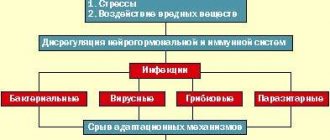Weakness occurs with many diseases, so it is almost impossible for a non-specialist to immediately determine what happened. Weakness in the legs is a very nonspecific symptom that can accompany disturbances in the functioning of many organs and systems. However, such a symptom should never be ignored, since even after heavy physical activity, weakness should go away after a short rest. If weakness in the legs occurs for no apparent reason, much less repeats repeatedly or its severity intensifies, you should consult a doctor immediately.
As mentioned earlier, there are many reasons for weakness in the legs; accordingly, the patient is faced with the question - what specialty should he see a doctor? Most often, such a specialist becomes a neurologist, and a little less often a therapist and an orthopedic traumatologist.
At CELT you can get advice from a neurologist.
- Initial consultation – 3,500
- Repeated consultation – 2,300
Make an appointment
Causes of weakness in the legs
Conventionally, the reasons can be divided into several groups:
- damage to the vascular system;
- muscle damage;
- damage to peripheral nerves;
- diseases of the central nervous system (brain or spinal cord);
- psychological and mental problems;
- joint diseases;
- diseases of the spine;
- intoxication.
During the initial examination and history taking, special attention is paid to the dynamics of the process - whether the weakness arose suddenly or gradually increased, whether it is constant or intermittent, and so on. It is important to find out not only the events that preceded the appearance of weakness in the legs, but also the accompanying symptoms: pain, swelling, convulsive twitching, dizziness, change in skin color, trembling, fever, degree of movement impairment, and the like.
A comparison of clinical and laboratory data allows you to quickly understand which disease of which organ or system caused weakness in the legs. CELT doctors have at their disposal an excellent diagnostic base, with the help of which they can determine not only the disease itself, but also how long it has existed, as well as its severity and prognosis.
Diagnostics
The most common opinion among the majority when complaining of a feeling of weakness is chronic fatigue, “manager's syndrome”. Most often, people tend to think about the presence of somatic diseases. It is not uncommon for a person, starting to feel weak in the body, to go to a therapist. The therapist finds nothing and either advises you to rest or sends you to some other doctor. And the story of visits to offices begins. When the patient finally miraculously gets to the office of our psychotherapist, the disease is already quite strong and it is not so easy to defeat it. Although, at the initial stages this problem can be solved quite easily.
If a person feels persistent or gradually increasing fatigue, exhaustion, weakness throughout the body or in various parts of the body, then there are grounds for concern. This feeling of weakness may be the result of psycho-emotional overload. The peak of psycho-emotional fatigue usually occurs in the morning; the condition may improve in the evening. These conditions indicate a breakdown of higher nervous activity and the formation of a mental disorder.
Disorders of higher nervous activity, accompanied by a chronic feeling of weakness in different parts of the body, weakness, can be described by people in a variety of ways.
Our doctors
Pankov Alexander Rostislavovich
Neurologist
40 years of experience
Make an appointment
Novikova Larisa Vaganovna
Neuropathologist, Candidate of Medical Sciences, doctor of the highest category
Experience 39 years
Make an appointment
Circulatory disorders
Vascular diseases of the nervous system, which can result in stroke and heart attack, are becoming more common among patients. In this case, situations of so-called transient ischemic attacks are possible, when a “flickering” of symptoms occurs - weakness occurs acutely, but quickly passes. After such an incident, you cannot be complacent and assume that everything turned out okay. It is necessary to identify the cause of the incident as quickly as possible and take appropriate preventive measures.
Stroke and heart attack can occur not only in the brain, but also in the spinal cord. A spinal stroke that occurs at any level can leave a person disabled or require a long and incredibly labor-intensive recovery. It must be said that due to the structure of the spinal cord, recovery after a spinal stroke is rarely successful, even in comparison with a stroke that affects the brain.
Weakness in the limbs may result from myocardial infarction, in which case gastrointestinal symptoms are often associated - nausea, abdominal pain, bloating. Some forms of heart attack thus remain undiagnosed, since the clinical picture is not typical and “imitates” an acute disease of other organs (for example, acute pancreatitis).
The veins or arteries of the lower extremities may be affected. Chronic venous insufficiency not only reduces physical strength, leads to pain and causes aesthetic problems, but also threatens the formation or separation of a blood clot (which, if the circumstances are unsuccessful, can block the pulmonary artery - pulmonary embolism is often a fatal condition). Blood stagnation also occurs in chronic heart failure, when swelling appears in the legs.
The formation of atherosclerotic plaques in the lumen of the vessel is a common cause of gait disturbance in the elderly. The so-called “intermittent claudication” develops.
Obliterating endarteritis also manifests itself as intermittent claudication, when the lumen of the vessels gradually narrows. Raynaud's disease is manifested by changes in skin color, weakness and swelling, the trigger for which is often hypothermia or frostbite. Menopause and premenstrual syndrome can also cause transient leg weakness.
Treatment
Help before diagnosis
If weakness is caused by natural causes, it is enough to normalize your lifestyle. Patients are recommended to get a full night's sleep of at least 7 hours, avoid night shifts at work, and minimize stressful situations and conflicts. A change of environment helps to cope with fatigue - a trip to a sanatorium, a vacation at sea. It is important to provide a nutritious diet high in protein foods, fresh vegetables and fruits. It is advisable to completely avoid alcohol. For prolonged weakness, combined with other symptoms, the doctor selects treatment.
Normalizing your lifestyle is the first step towards combating loss of strength
Conservative therapy
The main treatment for general malaise is therapy aimed at eliminating the cause of symptoms: taking antihistamines for allergic reactions, cardiotropic drugs for cardiovascular diseases, hepatoprotectors for liver damage. For weakness after food poisoning, a diet excluding spicy and smoked foods and extractive substances is recommended. Symptomatic medications are used that improve overall well-being and restore performance. The most effective are:
- Adaptogens
. Concentrated plant extracts of ginseng, eleutherococcus and other medicinal plants tone and invigorate, increase the activity of metabolic processes. Medicines are taken for a long time, they have virtually no contraindications or side effects. - Nootropics
. The drugs stimulate blood circulation in the brain and ensure the delivery of nutrients to neurons. Nootropics improve cognitive functions of the brain, increase memory and concentration. The drugs are used for encephalopathy, the consequences of head injury and encephalitis. - Antidepressants
. Specific serotonin receptor agonists as etiotropic therapy help with depressive disorders. In minimal doses they are indicated for chronic fatigue and malaise caused by severe diseases of the internal organs and endocrine glands. - Vitamins
. For peripheral neuropathies and other neurological disorders, B vitamins are prescribed. To improve general well-being and normalize metabolism, ascorbic acid and the antioxidant tocopherol are used. Vitamin preparations are combined with essential microelements. - Sorbents.
Preparations based on activated carbon are effective for ailments caused by poisoning. The products bind and remove toxins from the gastrointestinal tract. In case of severe intoxication, parenteral administration of infusion saline solutions is necessary.
Physiotherapy
To reduce weakness, various methods of hydrotherapy (Charcot's shower, contrast shower) are useful, which have a general strengthening and tonic effect. A similar effect is observed after using acupuncture and electromagnetic therapy. To improve muscle tone and endurance, a general massage is prescribed and an individual exercise therapy complex is selected. People suffering from depressive conditions require long-term psychotherapy in several areas: auto-training, cognitive behavioral therapy, gestalt therapy.
Sensory disturbances due to nerve damage
This is the most common disorder in diabetes mellitus - polyneuropathy, which almost inevitably occurs 15 or 20 years after the onset of the disease, but everything can happen much earlier. Numbness, heaviness, and decreased sensitivity appear.
The same disorders occur with funicular myelosis or degenerative disease of the spinal cord, when deep sensitivity is immediately impaired.
Neurologists identify many causes of polyneuropathy - from viruses to chronic alcoholism. Among them are tick bites, cytomegalovirus, tumors, diphtheria, chemical poisoning and much more.
Psychological problems
Emotions influence our lives much more than we realize. The fact is that the body’s reactions are regulated by the autonomic nervous system, another name for which is the autonomic one. This system operates according to its own laws, regardless of our will and desires. Therefore, the body's reactions - heartbeat, breathing, blood circulation, digestion, spasms - practically cannot be regulated by willpower. Our every daily experience, and even more so mental illness, affects the functioning of all organs and systems.
Weakness in the legs occurs with the following disorders:
- panic attack;
- hysteria;
- prolonged stress;
- anxiety disorder;
- depression;
- schizophrenia;
- nervous exhaustion or neurasthenia;
- chronic psychotrauma;
- neurocirculatory dystonia.
Clinical classification of malaise
Depending on the mechanism of development and manifestation of the condition, it is classified into the following types:
- generalized weakness that develops and progresses slowly;
- acute and rapidly progressing condition;
- recurrent and intermittent general weakness.
The nature of the formation and development of illness is a factor that plays an important role in determining the causes of illness. So, for example, the first type of condition may be characteristic of:
- sarcoidosis;
- myopathies;
- connective tissue diseases;
- intoxication;
- oncological processes;
- metabolic disorders;
- endocrinopathies;
- psychogenic weakness;
- general somatic diseases with and without damage to the neuromuscular system.
An acute condition with sharp progression can develop with myopathy, damage to the nervous system due to poliomyelitis, as well as with psychogenic weakness.
The last type of pathological condition occurs in diseases of the central nervous system and neuromuscular lesions (myasthenia gravis, periodic paralysis).
Bone lesions
Weakness and decreased muscle strength in the legs may be the first sign of osteoporosis, or decreased bone mineral density.
Muscle tendons lose support. It is not uncommon for people who constantly use their limbs to suffer from a “stress fracture” of the foot. This happens when a critical mass of microtraumas accumulates from the same type of loads - from running, walking, jumping, jerking. Such injuries occur not only in athletes, but also in people constantly engaged in monotonous physical work.
Some bone tumors develop gradually and imperceptibly, so at first nothing but weakness bothers the person.
Signs of oncological processes
Constant weakness in cancer patients may be part of the general symptoms of the underlying disease. Weakness is caused by intoxication of the body, because a growing tumor releases toxic products of its vital activity into the surrounding tissues and vessels. Moreover, the malaise manifests itself in other signs. The early stages of tumor development are usually asymptomatic, and as the process progresses, painful sensations may develop due to the pressure of the tumor on surrounding tissues, nerve endings, and vital centers, depending on the location of the tumor. In addition, the sick person loses his appetite, and his weight begins to decrease. The worst thing is when the appetite is normal and the person eats normally, but the weight is still melting before our eyes - this means that metabolic processes are disrupted. One of the early signs of cancer may be an unreasonable increase in body temperature. In fact, the reason is that the tumor suppresses the immune system, which responds in this way. The patient may feel increased sweating and often breaks into a cold sweat.
Daily overload
A load that exceeds the physiological load for a long time inevitably leads to weakness in the legs.
This is primarily excess weight, when the joints and muscles of the lower extremities bear excessive load for a number of years. Obesity destroys bones, muscles and ligaments very slowly, and it seems to go unnoticed. But if you compare the physical capabilities of people with normal weight and obesity, the comparison will not be in favor of the latter. The third trimester of pregnancy is a test for a woman’s musculoskeletal system, when she is forced to adapt to her growing body weight. Lymphostasis or elephantiasis is another reason for the increased load on the legs.
Intoxication
Any poisoning or infection causes general poisoning of the body and failures in many systems. Even a common ARVI, not to mention a bacterial infection, is accompanied by general weakness. Sunstroke, harmful working conditions, stale food - everything can lead to weakness, and each reason needs to be dealt with. In many cases, long-term alcoholism is destructive to nerves and muscles.
CELT doctors, who have unique practical experience, will help to accurately determine the cause of the disease.
Make an appointment through the application or by calling +7 +7 We work every day:
- Monday—Friday: 8.00—20.00
- Saturday: 8.00–18.00
- Sunday is a day off
The nearest metro and MCC stations to the clinic:
- Highway of Enthusiasts or Perovo
- Partisan
- Enthusiast Highway
Driving directions









